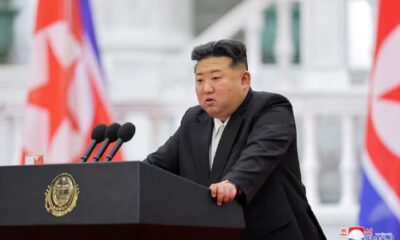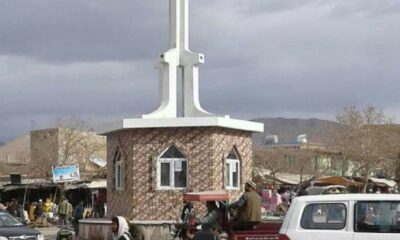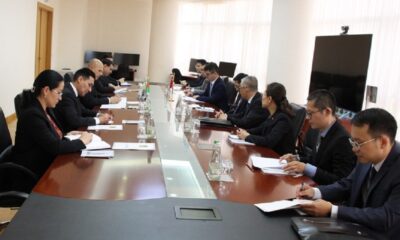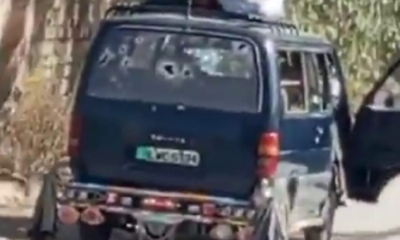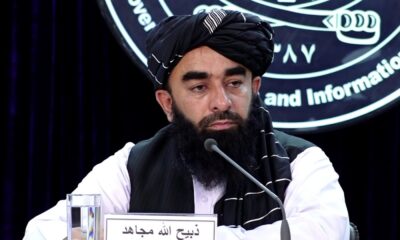World
Biden says missile that killed two in Poland may not have come from Russia
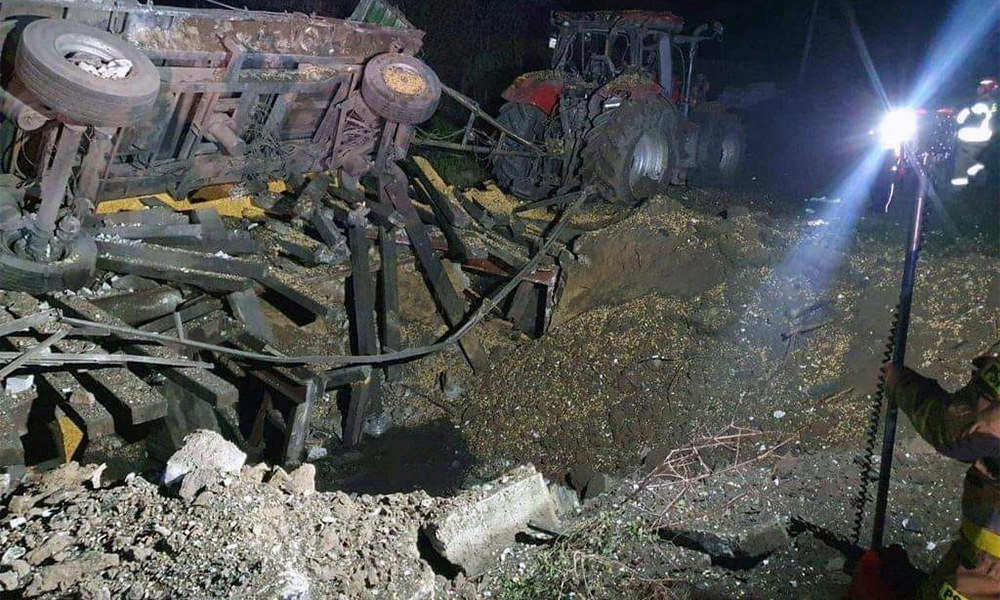
A missile that killed two people in Poland was probably not fired from Russia, US President Joe Biden said on Wednesday after an emergency meeting of NATO leaders called to discuss what Poland called a strike by a Russia-made projectile, Reuters reported.
The explosion on Tuesday at a grain facility near the Ukrainian border came as Russia unleashed a wave of missile attacks targeting Ukrainian energy infrastructure, raising concerns the conflict could spill into neighbouring countries.
According to Reuters the Polish foreign ministry said the rocket fell on Przewodow, a village about 6 km (4 miles) from the border with Ukraine. Russia denied it was responsible for the explosion but Polish officials said the missile was Russian-made.
A resident who declined to be identified said the two victims were men who were near the weighing area of a grain facility.
A Russian strike on Poland could risk widening the conflict between Russia and Ukraine as members of the North Atlantic Treaty Organization (NATO) are committed to collective defence under its Article 5, read the report.
Biden convened a meeting of leaders gathered for the G20 meeting in Bali, Indonesia, to discuss the incident. Leaders from NATO members Germany, Canada, Netherlands, Spain, Italy, France and Britain attended, as well as non-NATO member Japan and representatives from the European Union.
Asked whether it was too early to say if the missile was fired from Russia, Biden said: "There is preliminary information that contests that. I don't want to say that until we completely investigate it, but it is unlikely in the lines of the trajectory that it was fired from Russia but we’ll see.”
The United States and NATO countries would fully investigate before acting, Biden said.
The explosion in Poland came as Russia pounded cities across Ukraine with missiles, in attacks that Kyiv said were the heaviest wave of strikes in nearly nine months of war. Some hit Lviv, which is less than 80 km (50 miles) from the border with Poland, Reuters reported.
Ukrainian President Volodymyr Zelenskiy said Russian missiles hit Poland in a "significant escalation" of the conflict. He did not provide evidence of Russia's involvement.
"All of Europe and the world must be fully protected from terrorist Russia," he said in a tweet after a phone call with Polish President Andrzej Duda.
Two European diplomats said Poland requested a NATO meeting under the treaty's Article 4 for consultations among the allies. Poland was also increasing the readiness of some military units, Polish Prime Minister Mateusz Morawiecki said.
Polish officials sought to avoid inflaming the situation. Morawiecki called on all Poles to remain calm, and President Duda said there was no concrete evidence showing who fired the missile and that it was a one-off incident, read the report.
Biden told Duda in a call that Washington has an "ironclad commitment to NATO" and will support Poland's investigation, the White House said.
The Associated Press earlier cited a senior US intelligence official as saying the blast was due to Russian missiles having crossed into Poland.
But in Washington, the Pentagon, White House and US State Department said they could not corroborate the report and were working with the Polish government to gather more information. The State Department said the report was "incredibly concerning."
Germany and Canada said they were monitoring the situation, and the European Union, the Netherlands and Norway said they were seeking more details. French President Emmanuel Macron ordered a verification effort, while Britain was "urgently" looking into the report.
According to Reuters Russia's defence ministry denied that Russian missiles hit Polish territory, describing such reports as "a deliberate provocation aimed at escalating the situation".
Kremlin spokesperson Dmitry Peskov said he had no information on an explosion in Poland.
Latvian Deputy Prime Minister Artis Pabriks said the situation was "unacceptable" and it could lead to NATO providing more anti-aircraft defences to Poland and Ukraine.
Lithuanian President Gitanas Nauseda said on Twitter: "Every inch of #NATO territory must be defended!"
Ukrainian Defence Minister Oleksiy Reznikov said Kyiv had warned of the danger Russian missiles posed to neighbouring countries and called for a no-fly zone to be imposed, read the report.
"We were asking to close the sky, because sky has no borders. Not for uncontrolled missiles. Not for the threat they carry for our EU & NATO neighbours. Gloves are off. Time to win," he said in a Twitter post.
World
North Korea’s Kim accuses US of stoking tension, warns of nuclear war

North Korean leader Kim Jong Un has accused the United States of ramping up tension and provocations, saying the Korean peninsula has never faced a greater risk of nuclear war, state media KCNA said on Friday.
The comments came amid international criticism over increasingly close military co-operation between Pyongyang and Moscow, and assertions that North Korea sent more than 10,000 troops to Russia to support its invasion of Ukraine, Reuters reported.
Previous negotiations with Washington have only highlighted its "aggressive and hostile" policy toward North Korea, Kim said in a speech at a military exhibition in Pyongyang, the capital, the KCNA news agency said.
"Never before have the warring parties on the Korean peninsula faced such a dangerous and acute confrontation that it could escalate into the most destructive thermonuclear war," he said on Thursday.
"We have already gone as far as we can on negotiating with the United States," he said, adding that the talks had only shown its aggressive and hostile policy toward North Korea could never change.
North Korean state media have not yet publicly mentioned the re-election of Donald Trump, who held three unprecedented meetings with Kim during his first term, in Singapore, Hanoi, and at the Korean border, in 2018 and 2019.
But their diplomacy yielded no concrete outcome due to the gap between U.S. calls for North Korea to abandon its nuclear weapons and Kim's demands for sanctions relief.
Trump has long touted his ties with Kim, saying last month the two countries would have had "a nuclear war with millions of people killed", but he had stopped it, thanks to his ties with the North's leader.
Hong Min, a research fellow at the Korea Institute for National Unification in Seoul, said Kim could be trying to underscore the North's nuclear capabilities ahead of Trump's second term, while leaving the door open for diplomacy.
"He might be suggesting Trump should show his 'willingness to co-exist' before re-opening any talks and calling for a change in the U.S. hostile attitude," Hong said.
MILITARY EXHIBITION
Kim also called for developing and upgrading "ultra-modern" versions of weaponry, and vowed to keep advancing defence capabilities to bolster the North's strategic position, KCNA said.
Strategic and tactical weapons were on display at the event, called the Defence Development Exhibition.
KCNA pictures showed the Hwasong-19 and 18 intercontinental ballistic missiles, the Chollima-1 rocket used in a successful satellite launch in November 2023, and the Saetbyol-9 multi-purpose attack drone, which resembles the U.S. Reaper.
Hong said the pictures also included several weapons needed by or presumed to already have been supplied to Russia for its war in Ukraine, such as 240mm multiple rocket launchers, self-propelled howitzers, anti-tank systems and drones.
North Korea has shipped additional arms to Russia, the South's lawmakers said on Thursday, after being briefed by the national intelligence agency.
Last year, when he was defence minister, Russian Security Council Secretary Sergei Shoigu accompanied Kim to a defence fair that showcased missiles and weapons.
Last week, Kim urged the North's military to improve its war-fighting capabilities, blaming the United States and its allies for stoking tension to "the worst phase in history" and calling the Korean peninsula "the world's biggest hotspot".
World
ICC issues arrest warrants for Israel’s Netanyahu, Gallant and Hamas leader
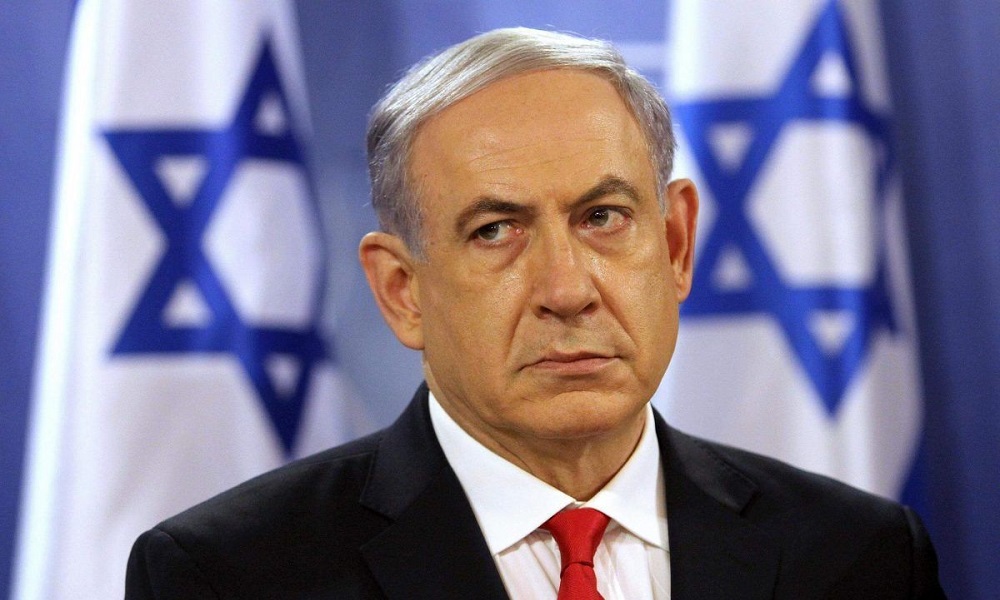
Judges at the International Criminal Court have issued arrest warrants for Israeli Prime Minister Benjamin Netanyahu and his former defence chief, as well as a Hamas leader, Ibrahim Al-Masri, for alleged war crimes and crimes against humanity, Reuters reported on Thursday afternoon.
The move comes after the ICC prosecutor Karim Khan announced on May 20, that he was seeking arrest warrants for alleged crimes connected to the Oct.7, 2023 attacks on Israel by Hamas and the Israeli military response in Gaza.
The ICC said Israel's acceptance of the court's jurisdiction was not required.
Israel has rejected the jurisdiction of the Hague-based court and denies war crimes in Gaza.
Israel has said it killed Al-Masri, also known as Mohammed Deif, in an airstrike but Hamas has neither confirmed nor denied this.
World
US vetoes UN Security Council resolution on Gaza ceasefire

The United States on Wednesday vetoed a U.N. Security Council resolution for a ceasefire in Gaza, drawing criticism of the Biden administration for once again blocking international action aimed at halting Israel's war with Hamas.
The 15-member council voted on a resolution put forward by 10 non-permanent members that called for an "immediate, unconditional and permanent ceasefire" in the 13-month conflict and separately demanded the release of hostages, Reuters reported.
Only the U.S. voted against, using its veto as a permanent council member to block the resolution.
Robert Wood, deputy U.S. ambassador to the U.N., said Washington had made clear it would only support a resolution that explicitly calls for the immediate release of hostages as part of a ceasefire.
"A durable end to the war must come with the release of the hostages. These two urgent goals are inextricably linked. This resolution abandoned that necessity, and for that reason, the United States could not support it," he said.
Wood said the U.S. had sought compromise, but the text of the proposed resolution would have sent a "dangerous message" to Hamas that "there's no need to come back to the negotiating table."
Israel's campaign in Gaza has killed nearly 44,000 people and displaced nearly all the enclave's population at least once. It was launched in response to an attack by Hamas-led fighters who killed 1,200 people and captured more than 250 hostages in Israel on Oct. 7, 2023.
Members roundly criticized the U.S. for blocking the resolution put forward by the council's 10 elected members: Algeria, Ecuador, Guyana, Japan, Malta, Mozambique, South Korea, Sierra Leone, Slovenia and Switzerland.
"It is deeply regretted that due to the use of the veto this council has once again failed to uphold its responsibility to maintain international peace and security," Malta's U.N. Ambassador Vanessa Frazier said after the vote failed, adding that the text of the resolution "was by no means a maximalist one."
"It represented the bare minimum of what is needed to begin to address the desperate situation on the ground," she said.
Food security experts have warned that famine is imminent among Gaza's 2.3 million people.
U.S. President Joe Biden, who leaves office on Jan. 20, has offered Israel strong diplomatic backing and continued to provide arms for the war, while trying unsuccessfully to broker a ceasefire deal between Israel and Hamas that would see hostages released in exchange for Palestinians held by Israel.
After blocking earlier resolutions on Gaza, Washington in March abstained from a vote that allowed a resolution to pass demanding an immediate ceasefire.
A senior U.S. official, who briefed reporters on condition of anonymity ahead of Wednesday's vote, said Britain had put forward new language that the U.S. would have supported as a compromise, but that was rejected by the elected members.
Some members were more interested in bringing about a U.S. veto than compromising on the resolution, the official said, accusing U.S. adversaries Russia and China of encouraging those members.
'GREEN LIGHT'
France's ambassador Nicolas de Riviere said the resolution rejected by the U.S. "very firmly" required the release of hostages.
"France still has two hostages in Gaza, and we deeply regret that the Security Council was not able to formulate this demand," he said.
China's U.N. ambassador, Fu Cong, said each time the United States had exercised its veto to protect Israel, the number of people killed in Gaza had steadily risen.
"How many more people have to die before they wake up from their pretend slumber?" he asked.
"Insistence on setting a precondition for ceasefire is tantamount to giving the green light to continue the war and condoning the continued killing."
Israel's U.N. ambassador Danny Danon said ahead of the vote the text was not a resolution for peace but was "a resolution for appeasement" of Hamas.
"History will remember who stood with the hostages and who abandoned them," Danon said.
-
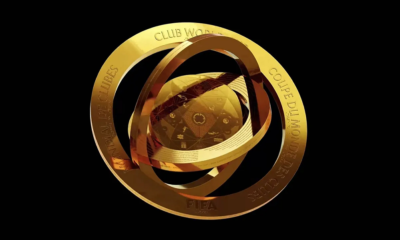
 Sport5 days ago
Sport5 days agoFIFA unveils Innovative Club World Cup Trophy ahead of new tournament in 2025
-

 Latest News5 days ago
Latest News5 days agoCanada sent 19 failed asylum seekers back to Afghanistan last year
-

 Sport4 days ago
Sport4 days agoAbu Dhabi’s thrilling T10 tournament just days away
-

 World4 days ago
World4 days agoBiden allows Ukraine to use US arms to strike inside Russia
-

 Sport4 days ago
Sport4 days agoAfghanistan beat UAE by 169 runs in U19 tri-series
-

 Business5 days ago
Business5 days agoMullah Baradar inaugurates a blanket factory in Kabul
-

 Latest News3 days ago
Latest News3 days agoTajikistan trumps Afghanistan 3-1 in football friendly
-
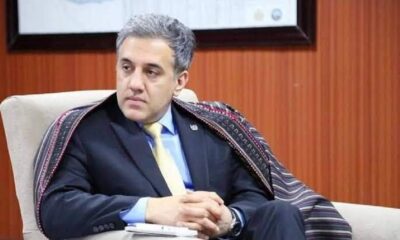
 Latest News4 days ago
Latest News4 days agoTwo Afghan diplomats posted to Germany under former government resign


